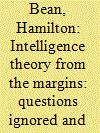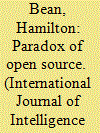| Srl | Item |
| 1 |
ID:
159926


|
|
|
|
|
| Summary/Abstract |
This article explores post-2009 contributions to intelligence theorizing that focus on critique and transformation of dominant IS ontologies and epistemologies. This exploration illuminates diverse theoretical resources that can help reveal hidden or misunderstood intelligence-related phenomena. The article contributes to recent calls for establishing a Critical Intelligence Studies subfield that attempts to move associated scholarship from the margins of Intelligence Studies to a more visible and influential position within the field.
|
|
|
|
|
|
|
|
|
|
|
|
|
|
|
|
| 2 |
ID:
090541


|
|
|
|
|
| Publication |
2009.
|
| Summary/Abstract |
Both US intelligence officials and intelligence studies scholars claim that 'organizational culture' is a cause of 'intelligence failure' and the proper locus of post-9/11 intelligence reform efforts. This essay uses a postmodern perspective to demonstrate how the dominant discourse of 'organizational culture' shapes stakeholders' understandings of accountability and what constitutes necessary, correct, or effective intelligence reform. By exploring institutional struggles over the meanings of 'culture' and 'accountability', this essay calls for reconsideration of the ways US intelligence officials and intelligence studies scholars talk about 'organizational culture' vis-a-vis post-9/11 intelligence reform.
|
|
|
|
|
|
|
|
|
|
|
|
|
|
|
|
| 3 |
ID:
130227


|
|
|
|
|
| Publication |
2014.
|
| Summary/Abstract |
The Associated Press (AP) reported on 8 November 2005 that, as part of post-11 September 2001 (9/11) United States intelligence reform efforts, the Director of National Intelligence (DNI) had established the Open Source Center (OSC). 1 Then-Director of the Central Intelligence Agency (CIA), former Florida congressman Porter Goss, described the OSC as a "major strategic initiative and commitment to the value we place on openly available information." 2 Challenging Goss's statement of commitment, the AP asserted that the OSC had actually been created, in part, in order to "elevate a brand of information [open source] that's long been a stepchild in the U.S. spy community." 3 Directed to "collect and study information that's publicly available around the world, including media reports, Internet postings and even T-shirts in Southeast Asia," 4 the OSC described itself as "the US Government's premier provider of foreign open source intelligence." 5 Visitors to the OpenSource.gov Website were told that the OSC offered authorized government employees and contractors "information on foreign political, military, economic, and technical issues beyond the usual media from an ever expanding universe of open sources
|
|
|
|
|
|
|
|
|
|
|
|
|
|
|
|
| 4 |
ID:
123177


|
|
|
|
|
| Publication |
2013.
|
| Summary/Abstract |
While the role of intelligence is to reduce uncertainty for decision-makers, a role of intelligence scholarship is to highlight uncertainty, that is, open up possibilities for ethical reflection and deliberation that conventional wisdom, institutional inertia, and mainstream research have closed off. Along these lines, this essay argues for the development and use of rhetorical and critical/cultural perspectives within the field of Intelligence Studies. It describes what rhetorical and critical/cultural research entails and explains how associated perspectives benefit the field.
|
|
|
|
|
|
|
|
|
|
|
|
|
|
|
|